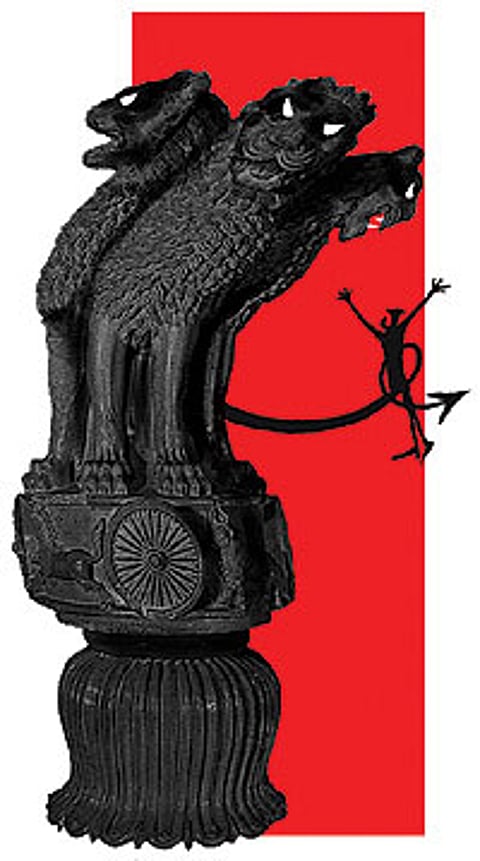L
ast month, the Saltwater Grill, a small Goan-style beach bar on Chowpatty in the centre of Bombay, was forced to close down. Reason: the bar, a little oasis of sandy ground, hammocks and lovely wooden benches looking onto the waters of Bombay Harbour, was an "illegal encroachment". The details of the case are sordid and boring. They involve the names of companies, an actor who invested in the Grill, the city collector, the Maharashtra Tourism Development Corporation (also known as the Maharashtra Tourism Destruction Corporation), the Prevention of Damage to Public Property Act and other horrible fictional monsters.All that is unimportant. What matters—the only thing that matters—is that the only little corner of beauty along the sad and filthy shambles that modern India has made of what should be its showpiece, the Bombay seafront, has vanished, perhaps forever. There are to be no more overpriced beers drunk with your toes in the sand and the water shaking in front of you in the lights of the great world-steamers. The steamers are gone, the beauty of Bombay is gone, even the name is gone. Nothing is left but ugly civil servants baying for the blood of anyone who wants to be left alone with their drink and their city.
There are to be no more evenings spent clung to your table with the tenacity of a limpet, while overdressed women wearing too much make-up wait for a table and glare angrily at you, then draw their gaze unwillingly past you to that beautiful, unforgettable bay. No more wondering why you paid so much money for indifferent food, and the next day, your heart drawn by the water, coming back yet once again to stare into the near distance and see a different Bombay reflect back from the forgiving stillness of the Arabian Sea.
When I heard they had closed the Grill, my heart sank and I was filled with anger. I didn't know why. All I could hear ringing in my ears was the music of Frank Sinatra. I saw Ol' Blue Eyes dressed in his best dark suit, crooning to an evening's worth of overpainted ladies and underfunded gentlemen the words, "Come fly with me, let's fly, let's fly away. If you could use some exotic booze, there's a bar in far Bombay...." I saw the lights dim, I heard the clatter of municipal workmen demolishing the bamboo structure, and I saw a little piece of India die. They have killed so much. When will they stop?
India isn't municipal corporators and courts who can't deliver a sane judgement in fifty years or any judgement in under ten years. It isn't people who take bribes and politicians who murder people and administrators who waste huge sums of money on every conceivable kind of scam while children die from drinking dirty water. It's none of those things. Those are the faces of this parasite called the Government of India, fastened on our back and gorging itself on our blood, taking just enough to keep from killing us, creating the destitution and poverty that are its natural environment.
India is beauty. It's everyone who tried to create something wonderful, everyone who left more in the world than they took from it, everyone who left us with beautiful memories. It's the music of A.R. Rahman, it's everyone from everywhere who came to this country and did something worthwhile. It's Gauhar Jan, an artiste of mixed European-Armenian-Jewish heritage who trained in Indian music in Lucknow and sang the first recorded Indian classical song at a recording studio in Calcutta in 1902.
Sixty-one years ago now we got a kind of independence from colonial rule, but it was a bitter, false one. We exchanged foreign masters for the cadre they had trained: the old civil servants, the police officers, the babus, the courts, and we added onto them a layer of greedy politicians. We got the freedom of the mob, and we lost nearly everything that was in our soul, and made ourselves the slaves of permits and licences.
Make us independent from these modern-day Mongols—throw the MTDC in the sea—smash the scruffy tinpot dictators who lord it over ordinary people in every government office. Let this be a truly free country with humanity, sensitivity and above all beauty and then, perhaps then, we can talk about independence.
